When Good Manners took a twirl around the festival circuit at the tail end of 2017, it quickly garnered the tag of the Brazilian movie that wasn't what you thought it was, a lively bag of tricks. Perhaps it was that tag that put UK distributors off, in the end: it suggested that, among the many things it was, the only thing it wasn't was the safe bet our arthouses have typically relied upon of late to keep their lights on. It would also have to count as a hard sell, requiring at the very least a trailer that flat-out lied to the cinemagoing public, lest it gave the game writer-directors Marco Dutra and Juliana Rojas were playing away. Finally emerging this week on MUBI's UK platform, it remains a tricky one to describe, yet it's just possible the recent endeavours of Jordan Peele and Bong Joon-ho will have readied adventurous streamers for the film's free-flowing mix of horror, fantasy and social observation. It opens in similar territory to 2015's excellent Brazilian offering The Second Mother, as well-to-do, single white mom-to-be Ana (Marjorie Estiano) recruits the serious, unsmiling Clara (Isabél Zuaa), to serve as her live-in nanny. Clara is Black, and as she observes the many absurdities of her paymaster's lifestyle - the stuffed animals mounted on the walls of her plush apartment, the daily Zumba sessions to maintain an Instagrammable figure - we note some tension beginning to creep into this cosily childproofed safe space. But she's also the closest the pariah-like Ana - whose family turned their backs on her after she refused to abort - has to a companion, a birthing partner and (here's where matters first get tricky) a lover. For much of the first hour, these women's relationship is itself in gestation; shifting and flipping in high-contrast black-and-white, it forms its own sort of sonogram. The film around them is similarly pregnant with possibility.
Only in its second half does Good Manners reveal its true nature (and whether it meets viewer expectation), and it's possible I may have already led you up the garden path by namedropping Peele and Parasite. Those are just two of the doors Dutra and Rojas open up before us; another would be the Guillermo del Toro-like contemporary folk tale; but the film also encompasses sleepwalking, dead cats, musical interludes, and a Chekhovian handgun. In short, precisely the last thing you could accurately describe it as would be well-mannered - it's way too restless for that - and one of the problems local distributors presumably ran up against is that the results were bound to throw off viewers who were OK with Good Manners being one type of film and less keen on whatever it was it morphed into, who came for the early social satire and felt suckered in some way by the softer, more sentimental proposition it became. (Good on them for retaining pangs of conscience: in some industries, there would doubtless be those who pocketed the ticket money before running off carefree into the night.) Viewers who do stay the course are likely to fall into two camps: those who raise an eyebrow (or stamp a foot) at Dutra and Rojas taking 135 minutes to tell what is essentially a shaggy-dog story, and those who take pleasure in the pleasure the filmmakers take in telling a tale for the sake of telling a tale. Without wanting to give too much else away, I'll just say that it struck me as one of the movies' livelier recent contributions to the nature-versus-nurture debate, while noting that it wouldn't work nearly so well as it does without the mournful, strongly empathetic Zuaa, a fixed point of compassion as a woman doing her best in difficult, rapidly changing circumstances. Those circumstances are to some degree the film entire. Good Manners is certainly a shapeshifter; for maximum enjoyment, you'll need to hold on as tight as you can.
Good Manners is available to stream from tomorrow via MUBI UK.

No comments:
Post a Comment